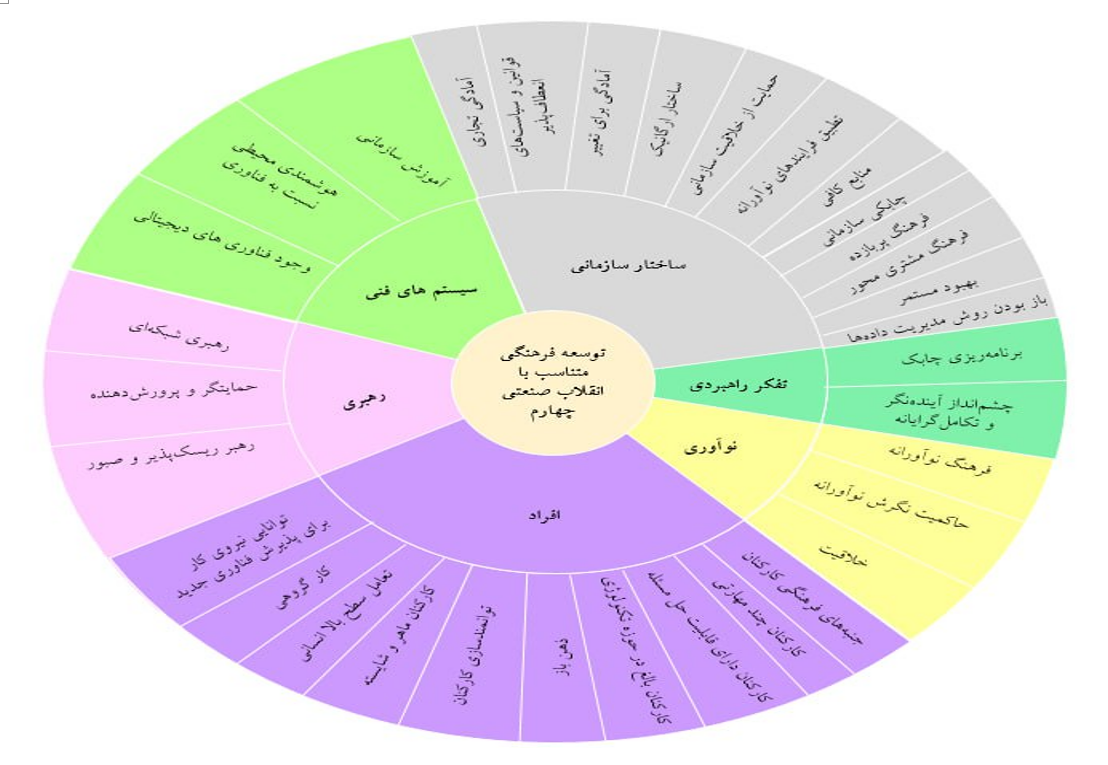Providing a Cultural Development Model in Public Organizations Aligned with the Fourth Industrial Revolution
Keywords:
Development, Cultural Development, Fourth Industrial Revolution, Government OrganizationsAbstract
The present study aimed to provide a cultural development model aligned with the Fourth Industrial Revolution. The research was applied in terms of its purpose, cross-sectional regarding time, and of a mixed-methods nature (sequential exploratory) conducted in two qualitative and quantitative phases. The qualitative phase was a meta-synthesis, while the quantitative phase was descriptive-correlational. The statistical population in the qualitative phase included document analysis and experts from public organizations in Iran as well as academic scholars. The sample size was determined to be 20 individuals in the qualitative phase, based on the principle of saturation, and 335 individuals in the quantitative phase, using sample size calculations for structural equation modeling. Sampling was purposive in the qualitative phase and non-random quota sampling in the quantitative phase. In the qualitative phase, data collection utilized two methods: (a) meta-synthesis (research synthesis) based on a systematic review and (b) semi-structured interviews. Reliability in this phase was ensured through intracoder reliability, and content validity was assessed. In the quantitative phase, descriptive and inferential statistical analyses were applied. Tests such as one-sample t-tests and structural equation modeling using SPSS and SmartPLS software were employed. Additionally, fuzzy AHP was used to prioritize the components. The results indicated that cultural development aligned with the Fourth Industrial Revolution includes six components: organizational structure, strategic thinking, innovation, individuals, leadership, and technical systems. Among these components, technical systems were identified as the top priority.
Downloads
References
Mesfin D, Woldie M, Adamu R. Perceived organizational culture and its relationship with job satisfaction in primary
hospitals of Jimma zone and Jimma town administration, correlational study. Health Services Research. 2020;20(2):219-35.
doi: 10.1186/s12913-020-05319-x.
Hasani V, Reza E, Majid D. Underdevelopment Due to Cultural Delay Resulting from Marginalization in Cities.
Journal of Applied Studies in Management and Development Sciences. 2019;4(15).
Egitim S. Challenges of adapting to organizational culture: Internationalization through inclusive leadership and
mutuality. Social Sciences & Humanities Open. 2022;5(1). doi: 10.1016/j.ssaho.2021.100242.
Ramaditya M, Prihantoro V. The Role of Organization Culture, Leadership and Training Towards Improving Work
Performance Country Civil Worker: Case Study in Financial and Development Supervisory Agency. International Journal of
Business Studies. 2020;4(2):115-26. doi: 10.32924/ijbs.v4i2.143.
Hadavand M, Alimardani D, Baziyan M, editors. Evaluation of Organizational Culture in Companies for Fostering
Digital Innovation Using Fuzzy Decision-Making Model. 6th International Conference on Management and Industry; 2023.
Pathiranage Y. Organizational Culture and Business Performance: An Empirical Study. International Journal of
Economics and Management. 2019;6(6):1-12. doi: 10.14445/23939125/IJEMS-V6I6P101.
Steiber A, Alänge S, Ghosh S, Goncalves D. Digital transformation of industrial firms: an innovation diffusion
perspective. European Journal of Innovation Management. 2020. doi: 10.1108/EJIM-01-2020-0018.
Vukšić VB, Ivančić L, Vugec DS. A preliminary literature review of digital transformation case studies. International
Journal of Computer and Information Technology. 2018.
Cerulo KA, Leschziner V, Shepherd H. Rethinking Culture and Cognition. Annual Review of Sociology. 2021;47:63-
doi: 10.1146/annurev-soc-072320-095202.
Correani A, De Massis A, Frattini F, Petruzzelli AM, Natalicchio A. Implementing a digital strategy: Learning from
the experience of three digital transformation projects. California Management Review. 2020;62(4):37-56. doi:
1177/0008125620934864.
Bendak S, Shikhli A, Abdel-Razek R. How changing organizational culture can enhance innovation: Development of
the innovative culture enhancement framework. Cogent Business & Management. 2020;7(1):1-14. doi:
1080/23311975.2020.1712125.
Chonsawat N, Sopadang A. Defining SMEs' 4.0 Readiness Indicators. Applied Sciences. 2020;10(24):8998. doi:
3390/app10248998.
Veile JW, Kiel D, Müller JM, Voigt KI. Lessons learned from Industry 4.0 implementation in the German
manufacturing industry. Journal of Manufacturing Technology Management. 2019;31:977.
Odważny F, Szymańska O, Cyplik P. Smart Factory: The requirements for implementation of the Industry 4.0
solutions in FMCG environment-case study. LogForum. 2019;14:257-67. doi: 10.17270/J.LOG.253.
Hahn GJ. Industry 4.0: A supply chain innovation perspective. International Journal of Production Research.
;58:1425-41. doi: 10.1080/00207543.2019.1641642.
Porter ME, Heppelmann JE. Smarte Produkte den Wettbewerb verändern. Harvard Business Management.
;12:35-60.
Xu LD, Xu EL, Li L. Industry 4.0: State of the Art and Future Trends. International Journal of Production Research.
;56:2941-62. doi: 10.1080/00207543.2018.1444806.
Hofmann E, Rüsch M. Industry 4.0 and the current status as well as future prospects on logistics. Computers in
Industry. 2017;89:23-34. doi: 10.1016/j.compind.2017.04.002.
Issa A, Hatiboglu B, Bildstein A, Bauernhansl T, editors. Industrie 4.0 roadmap: Framework for digital transformation
based on the concepts of capability maturity and alignment. Procedia CIRP; 2018.
Ziaei Nafchi M. Industry 4.0 and Preparing Companies for Implementing It. Hradec Kralove, Czech Republic:
University of Hradec Kralove; 2019.
Shamim S, Shuang C, Hongnian Y, Yun L. Examining the Feasibilities of Industry 4.0 for the Hospitality Sector with
the Lens of Management Practice. Energies. 2017;10:499. doi: 10.3390/en10040499.

Downloads
Published
Submitted
Revised
Accepted
Issue
Section
License
Copyright (c) 2024 Journal of Study and Innovation in Education and Development

This work is licensed under a Creative Commons Attribution-NonCommercial 4.0 International License.










